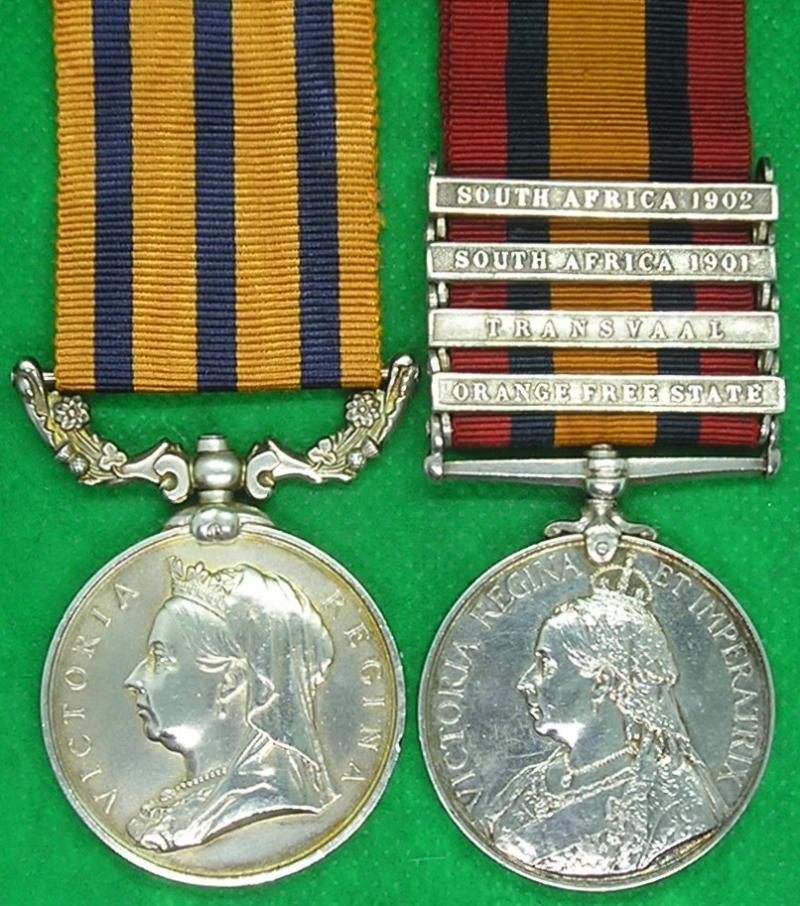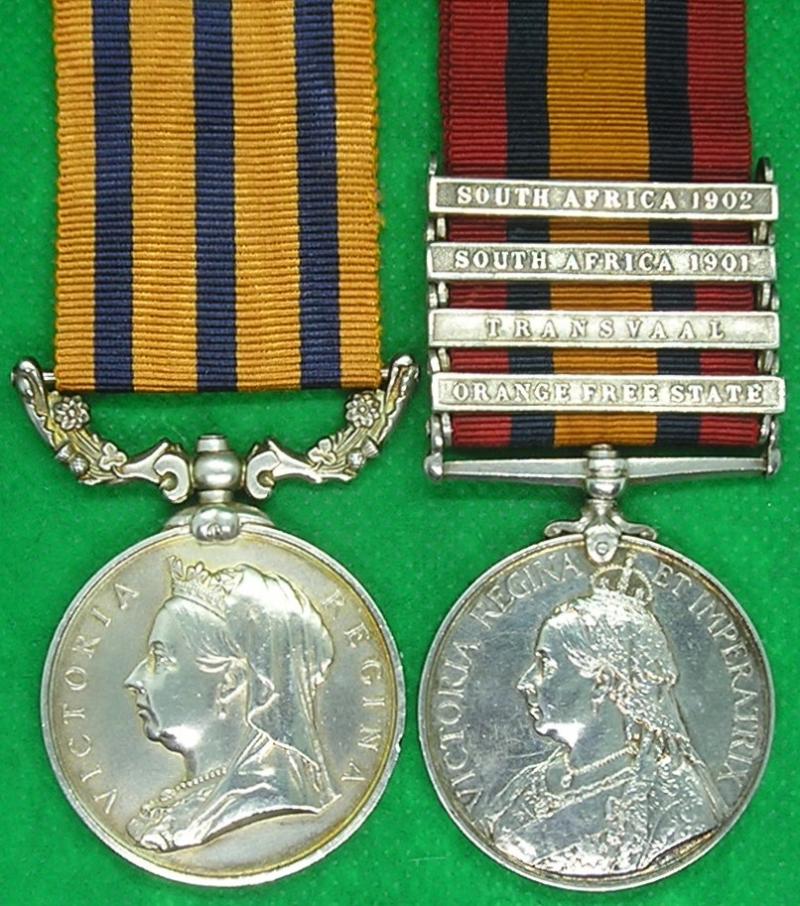BSA COY MATABELELAND 1893 & 4 BAR QSA, BLACK WATCH
B.S.A Company medal with Matabeleland 1893 reverse & QSA 1899-1902 With clasps for Orange Free State, Transvaal, South Africa 1901 & South Africa 1902
To- 4615.PTE.R.SCOTT.1st.R.HIGHRS
4615 Private Robert SCOTT, 1st Royal Highlanders and Bechuanaland Border Police
Robert Scott was born about 1869 in the parish of Shotts, Lanarkshire. He was the son of Walter Scott – whose address, in 1891, was noted as 'Buchanan's Buildings, Burnbank' - a small settlement situated between Hamilton and Blantyre, in Lanarkshire
On 12 October 1891, at Hamilton, Robert Scott attested for the Royal Highlanders. Having given his "Trade or Calling' as 'Farm servant', he agreed to serve '7 years with the Colors, and 5 years in the Reserve'. At that time, his height was measured at 5 feet 4 inches and he was noted to have a fresh complexion, with grey eyes and light brown hair. His 'Distinctive Marks' were also described: 'Blue mark under right eye & on right forehead, Scar front of chest & left forearm'. His 'Religious Denomination' was recorded as 'Presbyterian'.
Having been allocated No. 4615, Private Scott reached the Black Watch Depot at Perth on the following day, 13 October. After basic training, he was posted to the 2nd Battalion on 22 December 1891. He served in Ireland with this battalion -- and has been traced in its muster rolls as being present in Limerick on 1 February 1892, and on 1 August 1892.
Posted abroad to the 1st Battalion Black Watch, Robert Scott served in Gibraltar from 5 October 1892. He remained there up to 28 January 1893, when he embarked on HMS Himalaya, bound for Egypt. Having arrived at Abbassiyeh on 5 February 1893, the 1st Black Watch remained in Egypt until 3 March when the battalion was split in two. On that day, one half of the men left for Mauritius while, on 4 March 1893, the other half embarked once more on HMS Himalaya, bound for South Africa. Private Scott must have been with this half of the battalion, which reached Cape Town on 6 April 1893. Thereafter, he is shown on the muster rolls for 'B' Company as serving in Cape Town on both 1 June, and 1 December, 1893.
However, at the time of the latter date, he was actually attached to the Bechuanaland Border Police - his soldier's records noting that he 'served in the Matabele campaign from 18.10.93 to 21.3.94'. Indeed, Private Scott was one of only 18 men from the 1st Black Watch - one officer and 17 other ranks - who took part in this campaign as mounted infantry, and who went on to receive the British South Africa Company's Medal.
After exactly two years' service, he had been granted Good Conduct Pay – though he forfeited this on 6 July 1895. Shortly after, on 10 July 1895, Private Scott was noted to be 'in the hands of the Civil Power'. He was 'convicted of assault' the following day - then returned to duty on 12 July 1895. In his soldier's records, it was made clear that these two days spent in civil hands did not count towards his pensionable service.
Nevertheless, his Good Conduct Pay was restored on 5 February 1896 – following which, on 18 February 1896, he is noted to have commenced service in India. On 19 May 1899, his Good Conduct Pay was doubled, to 2d per day. Private Scott remained in India with the 1st Black Watch throughout the first years of the South African War. On 12 November 1901, at Kamptee, near Nagpur in central India, he agreed to extend his service to complete 12 years with the Colours. No doubt, the 397.8 Rupees he then received as a bounty played some part in persuading him to reach this decision- as it was fully intended to do.
At that time, the Empire had a pressing need to retain its trained soldiery – particularly with regard to the continuing conflict in South Africa. On 6 December 1901, the 1st Black Watch, Robert Scott included, arrived there — following which, he campaigned against the Boers in the Orange Free State and the Transvaal.
The war ended on 31 May 1902, though Private Scott remained in South Africa until October of that year, when he returned to the UK - landing there on 28 October 1902. He served at 'Home' for the remainder of his Army career and passed a mounted infantry course at Bulford, on 17 July 1903. However, even near the very end of his service, he forfeited a penny a day Good Conduct Pay on 20 July and, again, on 7 October 1903.
Having served for 12 years, Robert Scott was discharged from the Army on 12 October 1903 - still in the rank of Private - on the 'termination of his first period of engagement'.
The BSA Company medal is a regimental rarity as only 17 other ranks & one officer of the regiment were awarded it.
NEF & Complete with basic biographical & military research details.
Code: 55281
1950.00 GBP


